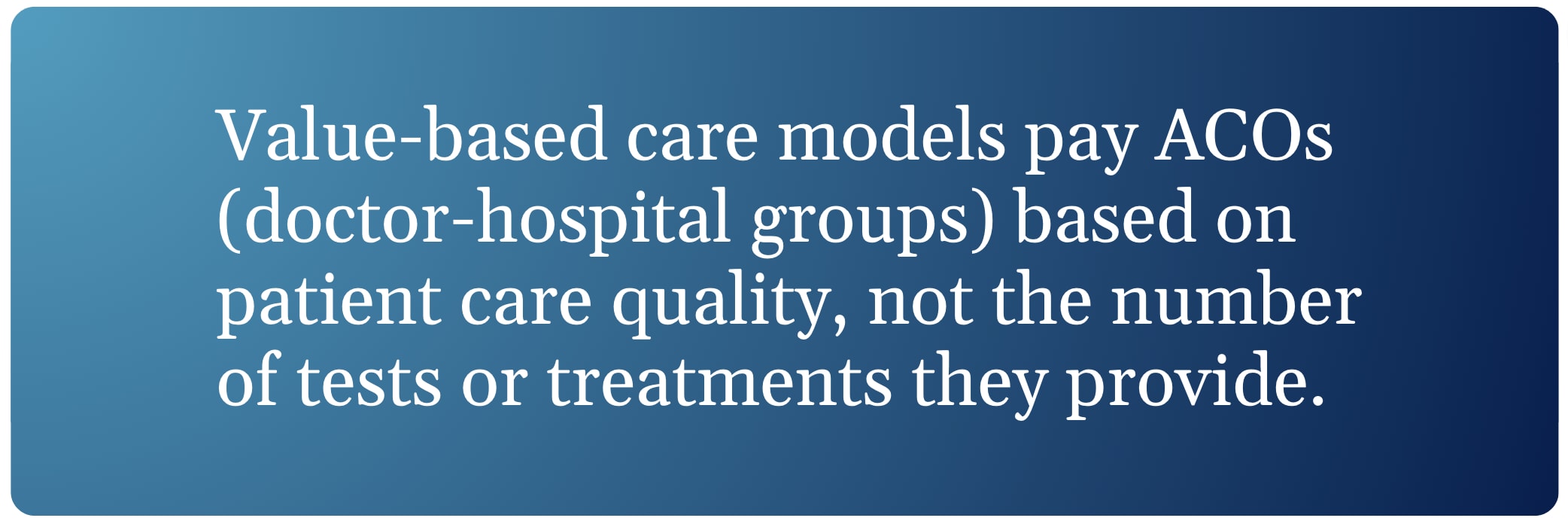What Is the Relationship Between ACOs and Value-Based Care?

This blog was originally published in August 2017 and was updated in April 2024
The Centers for Medicare & Medicaid Services (CMS) describes Accountable Care Organizations (ACOs) as “groups of doctors, hospitals, and other healthcare providers, who come together voluntarily to give coordinated high-quality care to their Medicare patients.” Independent physicians utilizing the Alternative Payment Model may participate in an ACO.
What is the relationship between the ACO structure and the current transition toward value-based care? We’ll discuss their relationship, the role of ACOs in driving value-based care initiatives, and the benefits of ACO participation in value-based care.

The different types of ACO Models
ACOs come in various models, each tailored to meet specific goals and challenges within the healthcare system. These models offer unique features to improve patient outcomes, enhance care coordination, and control healthcare costs. Understanding the differences and abilities of each ACO model is important for healthcare providers as they move towards value-based care.
Next Generation ACO Model
The Next Generation ACO Model aims to promote accountable care. It is designed for ACOs experienced in managing care for large groups of people, rather than individual patients.
It emphasizes patient-centered care, innovative payment models and mechanisms, and care coordination strategies. It provides clear financial goals and opportunities for coordinated care and aims to achieve the highest standards of care quality.
The Next Generation Model also offers a higher degree of risk and reward than earlier ACO models. Participants take on greater financial risks with the potential for higher rewards. This encourages ACOs to focus on efficient, high-quality care over quantity.
MSSP
The MSSP, or Medicare Shared Savings Program, motivates healthcare providers to offer coordinated, high-quality care to patients. Its goal is to facilitate collaboration among providers to reduce healthcare costs and improve patient outcomes. Within this model, providers can share in the savings they achieve for the Medicare program. This rewards cost-effective, patient-centered care.
ACOs in the MSSP must meet specific benchmarks for quality and cost efficiency. If an ACO delivers high-quality care while spending less, it can receive a share of the savings from Medicare. This creates a financial incentive to focus on preventive care and improve care coordination. In doing so, they improve health outcomes while controlling healthcare costs.
Pioneer ACO Model
The Pioneer ACO Model was designed for early adopters of coordinated care. This model encouraged innovating high-quality, cost-efficient care. While the goal was to improve health outcomes, it also worked to reduce unnecessary costs.
Unlike traditional ACO models, the Pioneer ACO Model had more flexible and potentially more lucrative payment arrangements. This reflected the higher risk and reward that these organizations were willing to accept. In this model, participants shared in cost savings with Medicare at higher rates than in the standard MSSP. However, they also faced higher penalties for failing to meet cost and quality targets.
Free eBook: How to Succeed in Value-Based Care as a Physician
Our free eBook is purpose-built for independent physicians who want to succeed in practicing VBC. Download now to get expert tips for success.
The relationship between ACOs and value-based care
As mentioned earlier, ACOs are groups of doctors and hospitals that work together to give better care to patients while trying to save money. Value-based care models pay these groups based on how well they care for patients, not on how many tests or treatments they provide.
Here's how ACOs and value-based care work together:
ACOs and value-based care focus on quality metrics and patient outcomes
ACOs and value-based care share a commitment to improve patient care and health outcomes. Both entities align financial rewards with quality metrics.
These metrics examine various aspects of care with the aim to improve patient health and reduce hospital readmissions. Healthcare providers then receive financial rewards for meeting these standards. This ensures patient well-being is the most important goal, representing a step toward improving healthcare overall.
ACOs and value-based care incorporate population health management principles
ACO value-based care focuses on improving the health of a group, not just individual patients, through population health management. This involves looking at data across the population to spot health risks and patterns, then implementing strategies to improve health outcomes.
By doing so, they aim to prevent illnesses and ensure they coordinate care well across different healthcare services.
Population health management helps provide understanding and care for the health needs of a whole population. It encourages a healthcare system that not only treats illnesses but works toward healthier communities.
How do ACOs drive value-based care initiatives?
ACOs are at the forefront of advancing these initiatives. They use their unique position to promote care coordination, use data analytics effectively, and boost patient engagement.
ACOs enable care coordination
At the heart of ACO value-based care is the principle of care coordination. Through various key strategies, ACOs enable smooth communication and collaboration among healthcare providers.
Sharing patient records electronically ensures every member of the care team has up-to-date patient data. Following evidence-based protocols keeps providers on the same page regarding treatments and care practices. Also, ongoing monitoring of performance metrics helps identify gaps and areas for improvement across all providers.
ACOs use analytics to drive value-based care initiatives
Data analytics serve as a cornerstone for ACOs in their quest to advance value-based health care system initiatives. Through the meticulous analysis of healthcare data, ACOs gain insights into patient care patterns.
These insights enable targeted interventions that promote efficiency and effectiveness in patient care. In essence, the relationship between ACOs and value-based care and data analytics improves patient outcomes while managing costs effectively.
ACOs drive greater patient engagement
ACOs and value-based care play a key role in engaging patients in their healthcare. They encourage patients' active involvement in their healthcare decisions. By extension, this helps improve care quality and patient satisfaction.
The benefits of ACO participation in value-based care initiatives
The collaboration between ACOs and value-based care is reshaping healthcare. By working together, they ensure that healthcare is effective and patient-centered. This approach improves patient health and emphasizes the importance of preventing health problems before they occur. Ultimately, it makes the healthcare system more proactive and patient-centered.
ACOs and value-based care improve healthcare quality
ACO value-based care improves healthcare quality by encouraging coordination between providers. Its focus on preventive care and quality metrics further elevates the quality of care. Providers receive rewards for offering quality care instead of quantity, and decisions are data-informed. These approaches lead to better health outcomes, increased patient satisfaction, and more efficient use of healthcare resources.
ACOs and value-based care promote preventive care
A hallmark of effective value-based care and ACO participation is the emphasis on preventive care. ACOs prioritize early intervention and prevention measures. This contributes to improved health outcomes, underscoring the critical role of prevention.
Succeed in Value-Based Care with our Free eBook
Learn more about how to successfully practice value-based care and provide the best outcomes possible for your patients in our free eBook. We offer expert strategies and tips for you to get reimbursed faster and manage patients efficiently.
FAQs
What is an Accountable Care Organization (ACO)?
ACOs epitomize patient-centered care. They foster partnerships between patients and providers that are fundamental to value-based care. Through coordinated care and patient engagement, ACOs aim to achieve higher-quality health outcomes. This approach also minimizes errors and improves the overall quality of care for patients with chronic or complex conditions.
What are the goals of an ACO?
The goals of an ACO revolve around improving health outcomes, improving care coordination, and controlling healthcare costs. ACOs focus on providing quality, affordable care that helps patients, providers, and the healthcare system overall.
What are examples of an ACO?
Examples of ACOs include physician-led groups, hospital-integrated systems, and practices with multiple specialties. They each come together to provide well-coordinated, high-quality care to their patients. These organizations vary in size and structure. Yet, they share a common goal to improve healthcare delivery by collaborating and sharing financial responsibility.
Is an ACO a part of value-based care?
Yes, ACOs are a foundational component of value-based care. ACOs connect healthcare providers' rewards to the quality and cost of care, implementing the concept of value-based care. This leads to better healthcare services and patient results.
